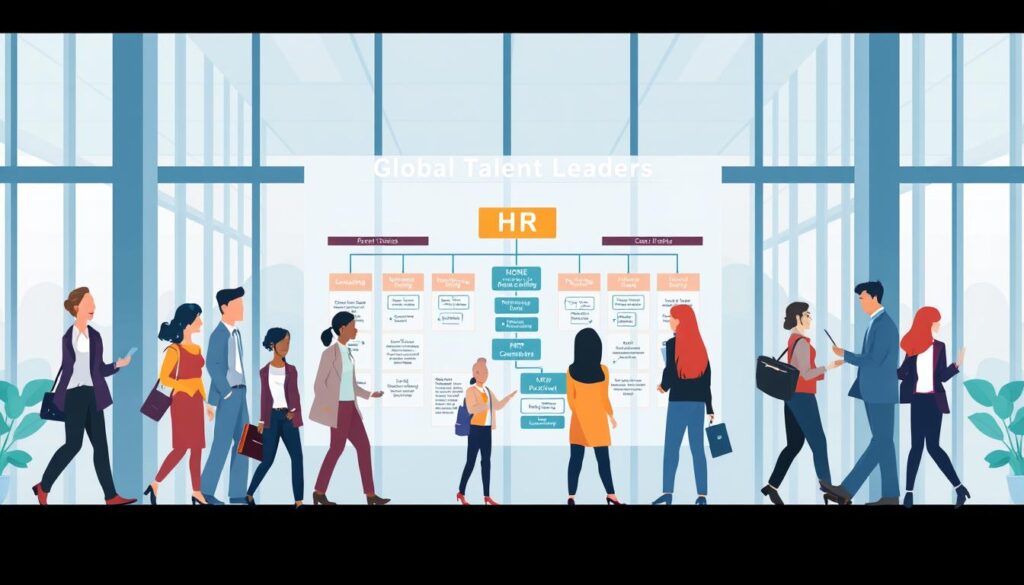Ever thought about changing a company’s culture and making employees happier? With 83% of companies focusing on people-centric culture1, and places like Google setting new standards for keeping talent2, People Operations is key to success. This article explores People Operations, showing it’s more than just HR. It offers tips on how to start a career in this field.
Looking to switch from traditional HR or new to the job market? We’ve got insights and steps for you to enter People Operations. Learn how to make a real difference in companies by grasping the basics and opportunities of this growing field.
Key Takeaways
- People Operations aims to create inclusive and engaging cultures, matching 83% of modern organizations’ goals1.
- Switching to People Operations can boost employee happiness and keep them around, like Google did with smart policies2.
- Using a people-first approach tackles big issues like burnout, affecting 77% of workers1.
- Getting into People Operations needs the right education, skills, and networking.
- Moving from traditional HR to People Operations means a big change in mindset and using new tech.
Understanding People Operations
People Operations, also known as People Ops or POPS, is a new way of looking at human resources. It goes beyond the usual HR tasks. It focuses on making the workplace better for employees and helping the company succeed.
Definition and Scope
At its heart, People Operations is about making work better for everyone. It aims to create a positive work culture. It also looks at how to improve employee happiness and growth.
For those new to HR, it’s key to understand People Operations. It involves making work better, using data, and promoting diversity and inclusion3.
The Origins of People Operations
Laszlo Bock at Google helped make People Operations well-known. He changed HR to focus more on people. This change was needed because work has changed, with more remote and hybrid jobs.
Companies that use People Operations see better employee engagement. They often have over 70% of employees happy4. They also use data to make better decisions, which can cut down on employee leaving by up to 25%5.

Key Differences from Traditional HR
Traditional HR mainly deals with rules and paperwork. People Operations is more strategic. It focuses on making employees happy and engaged, which helps the company make more money3.
Companies that switch to People Operations see big improvements. They have less division and more teamwork. They also keep employees longer and work better together5.
Why Choose a Career in People Operations?
Choosing a career in People Operations is exciting and rewarding. It’s perfect for those who love making workplaces better and happier. This field is all about improving employee experiences and satisfaction.
Employee-Centric Approach
People Operations is all about looking after employees from start to finish6. It’s different from old HR methods that just react to problems. A great People Operations team boosts employee happiness, growth, and keeps them around longer7.
People Ops focuses on making work places where everyone feels included and can do their best. It’s about putting employees first.
Opportunities for Impact
Working in People Operations means you can really change things for the better. Good People Ops plans can make employees 20% more productive, helping the company grow7. Also, companies that focus on People Operations see much higher employee happiness levels7.
This shows how important People Operations is for a company’s success and culture.

Career Growth and Opportunities
The need for People Operations experts is growing fast, with lots of job and growth chances. Companies that care about their employees can see huge benefits, like up to 300% return on investment7. Google’s People Ops model from 2006 has shown how to use data to improve HR8.
This approach is becoming more popular across many industries. It’s a great career choice for those who want to make a lasting difference.
How to Get Into People Operations
Starting a career in people operations requires education, skill building, and networking. You need to know the educational needs, key skills, and the role of mentorship and networking.
Educational Background
Most people in people operations have studied Human Resources, Business Administration, or similar fields. There’s also a push for certifications in People Analytics and Employee Experience Management. Many companies now look for these certifications to help HR careers grow9.
These qualifications give a strong base for understanding people operations. They help in moving up in HR careers effectively.
Key Skills to Develop
To do well in people operations, you need to develop important skills. These include strategic thinking, empathy, and analytical skills. These skills are key for daily tasks and creating a positive work environment.
Recent studies show that people operations focus on making employees happy, treating them like customers. This is a big change from old HR ways9. Strategic thinking and data analysis have also led to a 75% increase in staff in some cases10.
Networking and Mentorship
Networking and mentorship are key to entering and growing in people operations. Networking connects you with industry experts who can share insights and job leads. Mentorship offers personalized advice for your career goals.
Using platforms like LinkedIn, Twitter, and Pinterest has increased candidate pipelines by 125% for many10. Standardized hiring processes have also boosted hiring committee agreement by 25%10.
By focusing on education, skills, and networking, you can smoothly enter people operations. These steps help ensure a successful HR career. Together, they form a path to success in this changing field.
Essential Skills for Success in People Operations
To excel in people operations, you need a mix of skills. These skills help in developing HR skills and professional growth. Mastering these skills can make your team very effective, boosting your organization’s success.
Emotional Intelligence
Emotional intelligence is key in people operations. It lets you manage your feelings and understand others’. This skill is essential for a supportive work culture.
About 70% of employees feel more engaged in a positive work environment11. High emotional intelligence helps solve conflicts and encourages teamwork.
Data Analysis Skills
Being good at data analysis is vital in people operations. It helps make decisions based on data. Companies that use data analytics in HR can hire faster and better11.
Analyzing HR metrics like turnover and engagement helps plan better. It improves performance management too.
Effective Communication
Good communication skills are essential for success in people operations. They help in clear talks and understanding. HR pros need to explain policies, solve conflicts, and keep things transparent.
Companies that communicate well have better employee relations and onboarding12. Good communication also boosts productivity by 15%13.
Transitioning from Traditional HR to People Operations
Changing to HR transformation means big changes, focusing on how employees feel and strategic plans, not just paperwork14. Companies moving to People Operations see HR as a key player in success14. These changes help meet new employee needs and societal expectations, making businesses more adaptable15.
Mindset Shifts
The main shift in People Operations is from focusing on processes to people. It’s about making work better for each employee, not just following rules15. Companies with People Ops do better, handling the challenges of mixed work environments16. Unlike old HR, People Operations promotes teamwork and openness15.
Adopting New Technologies
Getting new tech is key in moving from old HR to People Operations. HR used to do a lot of manual work, but now it’s automated, making decisions based on data16. People Operations use a range of tools for HR tasks, like managing pay and benefits, and for tracking performance16. AI helps in finding the right people, making hiring smoother and fairer14.
Building a People-Centric Culture
Creating a culture that values people is central to HR transformation. People Operations offer custom benefits, not just one plan for everyone14. They focus on helping employees grow, unlike old HR’s limited training14. This approach boosts productivity and draws in the best talent, helping the business thrive15.
Typical Roles in People Operations
In People Operations, many roles are key to a great work environment and smooth HR processes. These roles include both leadership and specialized analysis, all aimed at creating a positive workplace culture.
Director of People Operations
The Director of People Operations shapes the department’s vision and leadership. They oversee all HR aspects, from hiring to letting employees go, making sure everything aligns with the company’s goals. This role is vital because hiring top leaders can cost a lot more than average jobs, making the Director’s work essential17. They also play a big part in keeping employees, as turnover rates in the US average 57.3%17.
People Operations Manager
The People Operations Manager handles daily HR tasks like policy making, onboarding, and keeping employees engaged. Good onboarding can keep new hires for up to 82% longer, showing how important this role is in keeping employees18. They also track important metrics like how fast employees are hired and how happy they are, helping the company stay in tune with employee needs17. In bigger companies, they might also manage a Learning & Development Specialist, showing the importance of training in HR careers18.
People Data Analyst
A People Data Analyst looks at HR data to help make decisions and plans. This role is critical for understanding things like employee happiness and diversity, helping to make the workplace better. Companies with strong People Operations teams see a 50% jump in employee satisfaction, showing the power of good data analysis18. Using data well helps recognize employee contributions, reducing turnover and improving HR opportunities in the company17.
Building a Successful People Operations Team
To create a top-notch HR team, you need to focus on several key areas. It’s all about building a team that works well together. Let’s look at what makes a People Operations team excel.
Key Components and Roles
A great People Operations team has different roles for each part of the employee journey. HR specialists handle recruitment, onboarding, and making sure everything is legal. They make sure new employees get off to a good start.
Getting feedback from employees is also important. It can make them 14% better at their jobs19. Also, helping employees grow in their careers can make them 70% more engaged19.
Roles like People Data Analysts use data to help the team make better decisions. This can lead to better employee retention and productivity. For example, good onboarding can keep new hires 82% longer and make them 70% more productive19.
Team Collaboration Strategies
Working well together is essential for any HR team. Regular meetings, clear communication, and shared goals are key. Checking in with employees can boost their mood and engagement20.
Supporting mental health can also help. It can cut down on absences by 30% and make employees 25% more productive19. These efforts can make the team perform better and keep employees happy, leading to better retention rates19.
Offering flexible work options can also improve morale and productivity. It’s important for a successful HR team1920. Companies that offer this can save up to 30% on office costs19. It’s good for both the employees and the company’s wallet.
Utilizing People Operations for Business Success
In today’s fast-paced business world, using People Operations (POPs) can really boost success. By linking HR efforts with the company’s big goals, businesses can turn their HR teams into key drivers of growth and new ideas. This means knowing what the company wants to achieve and shaping HR strategies to fit those goals.
Aligning with Organizational Goals
Companies that use People Operations tend to hit their targets better. This is because HR actions match up with business aims and they collect lots of data21. A strong company culture and happy employees help businesses do better than their rivals22. Good onboarding and ongoing learning are key to keeping employees engaged22.
Also, cutting down hiring time by 20% and making sure 75% of employees complete their professional growth plans are common goals in People Ops21.
Today’s People Operations go beyond just hiring and firing. They focus on making sure employees feel valued, supported, and wanted to stay. About 40% of workers feel unmotivated because they don’t get enough recognition, which can be fixed with smart HR strategies17. Regular feedback, chances for growth, and welcoming diversity make employees happier and help the company innovate2221.
Companies with strong People Ops are ready for quick changes in the workplace. They keep their business running smoothly and succeed22. By linking what employees do with the company’s goals, workers feel more driven and part of a strong team22. Being open about People Operations builds trust, and efforts to keep employees from leaving or missing work can save money and keep staff happy2217.
In summary, using People Operations to align HR with business goals is key. It boosts employee happiness and helps the company reach its targets. This makes HR a vital part of success in any organization.
Real-World Examples of People Operations
In recent years, People Operations has changed the way HR works. It uses new methods and data to improve. This section will show examples of effective HR and HR success stories from famous companies.
Case Study: Google
Google changed its HR under Laszlo Bock to lead in People Operations. It spends a lot on hiring, more than most companies23. A team of five to six employees checks each candidate to make sure they fit well23.
Google also uses data to make HR decisions. It tracks how employees do and how happy they are23. Gallup found that recognizing employees can boost productivity by 9%24.
Company Example: Databox
Databox puts people first with new People Operations ideas. This helps it keep the best employees. The company focuses on keeping employees happy and involved, leading to big wins.
Databox lets employees help shape the company’s culture and rules25. This shows how People Operations works well. Gallup says good employee engagement can lower turnover and burnout, keeping the company stable24. Databox sees employees as important customers, like the best companies do23.
Conclusion
Starting a career in HR, like People Operations, opens doors for growth. It’s more than just HR; it’s about creating a culture that values people. You’ll help improve employee well-being and contribute to the company’s success.
Did you know that onboarding programs can boost new hire retention by 82% and productivity by over 70%26? This shows the big difference you can make in this role.
Moving to People Operations means you’re entering a field that’s changing fast. Many HR pros want to be more strategic but don’t know how26. You can fill this gap and help drive important initiatives. Plus, 94% of employees want to stay at companies that invest in their growth26.
There’s a high demand for People Operations Managers, with thousands of jobs available on sites like Glassdoor27. It’s a great time to join this field. Companies are now combining HR, payroll, and benefits into one strategy, giving you many chances to make a difference27.
Begin your journey in People Operations today. It’s a chance to transform careers and make a real impact.












